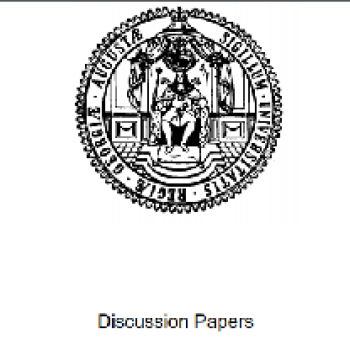Publication Information

A discussion paper titled 'Maternal Age and Offspring Human Capital in India' by Marcello Perez-Alvarez and Marta Favara, has been published by the Courant Research Centre, Georg-August-Universität Göttingen https://www.econstor.eu/bitstream/10419/200168/1/1668994607.pdf
Abstract
Early motherhood remains a widespread phenomenon in low- and middle-income countries (LMICs). While the consequences of early motherhood for the mother have been extensively investigated, the impact on their children is severely understudied, especially in LMICs, which host 95% of teen births globally (WHO, 2014). Using panel and sibling data from India, this paper investigates the effect of early maternal age on offspring human capital development in terms of health and cognition, and relies on mother fixed effects to allow for household and mother unobserved heterogeneity. Furthermore, this paper explores the evolution of these effects over time during childhood and early adolescence for the first time. Results indicate that early maternal age has an overall detrimental effect on offspring health and cognition. We show that children born to early mothers are shorter for their age and perform poorer in the math test. Interestingly, the effect on child’s heath is observed at early ages and weakens over time, while the cognition effect surges only in early adolescence. The analysis on heterogeneous effects suggests that children and in particular girls born to very young mothers are worst off. The transmission channel analysis tentatively hints at some behavioral channels driving the relationships of interest and documents a positive (and modest) association between height-for-age and subsequent math performance. Overall, our results support both restorative policies assisting children born to early mothers and preventive policies tackling early pregnancy.

A discussion paper titled 'Maternal Age and Offspring Human Capital in India' by Marcello Perez-Alvarez and Marta Favara, has been published by the Courant Research Centre, Georg-August-Universität Göttingen https://www.econstor.eu/bitstream/10419/200168/1/1668994607.pdf
Abstract
Early motherhood remains a widespread phenomenon in low- and middle-income countries (LMICs). While the consequences of early motherhood for the mother have been extensively investigated, the impact on their children is severely understudied, especially in LMICs, which host 95% of teen births globally (WHO, 2014). Using panel and sibling data from India, this paper investigates the effect of early maternal age on offspring human capital development in terms of health and cognition, and relies on mother fixed effects to allow for household and mother unobserved heterogeneity. Furthermore, this paper explores the evolution of these effects over time during childhood and early adolescence for the first time. Results indicate that early maternal age has an overall detrimental effect on offspring health and cognition. We show that children born to early mothers are shorter for their age and perform poorer in the math test. Interestingly, the effect on child’s heath is observed at early ages and weakens over time, while the cognition effect surges only in early adolescence. The analysis on heterogeneous effects suggests that children and in particular girls born to very young mothers are worst off. The transmission channel analysis tentatively hints at some behavioral channels driving the relationships of interest and documents a positive (and modest) association between height-for-age and subsequent math performance. Overall, our results support both restorative policies assisting children born to early mothers and preventive policies tackling early pregnancy.

